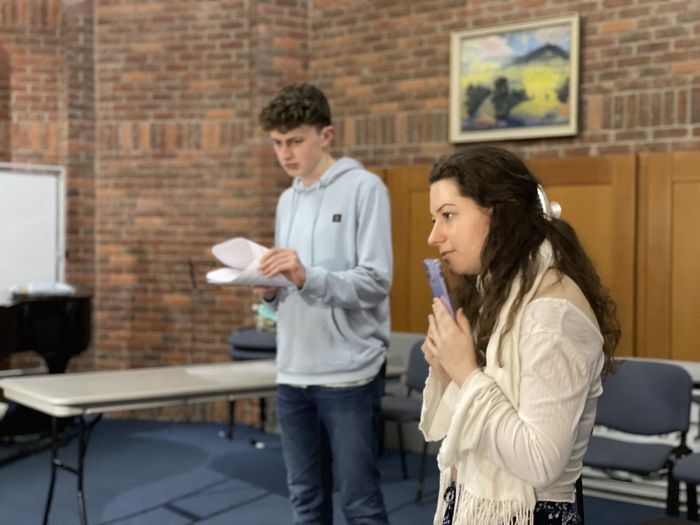Patronising supervisors and institutional power: Previewing The Spiteful Landsman
Lewis Andrews sits in on a rehearsal for Week 2′s intriguing Corpus lateshow

The Spiteful Landsman is a play which does not shy away from the big questions, namely those of class and institutional power. What makes it all the more striking for a student audience is its university setting, complete with scenes of supervisions and essay feedback. Student characters struggle with being told that they are “incredibly dogmatic” and too eager to thrust their “methodological ideas” upon the world. David, played by Louis Henry, is a particularly unlikeable, patronising supervisor, not willing to be argued with and resistant to differences of opinion. I sat in on a rehearsal of the Week 2 show and spoke with director Emma Gibson. What it was like to stage a production with its setting so close to home?
Emma: It’s a little awkward, because I know I’ve never had experiences like that with my supervisors… or at least I hope to never have those experiences… What’s difficult about rehearsals is that the setting is so close to day-to-day life; it can be difficult to get your headspace out of reality and to look at it more abstractly.
“Personal indignation and ego seem to completely overshadow the matter at hand”
Though the action might not be a product of direct experience, the question of how intellectual discussion is structured and how the bureaucracy that comes with scholarship shapes ideas are ones which are not so far removed. As Emma later added, “I was attracted to debating the way topics are taught” The characters seem to struggle with the anxiety of becoming the very dogmatic thinkers they so fear.
How far is the institutionalised intellectual dialogue a form of stasis, an unproductive and self-righteous folly, leaving behind and forgetting the actual lived experience of the real people that are being debated? The further the debate goes on between student and lecturer, the further the personal indignation and ego seem to completely overshadow the matter at hand. To highlight this point, Emma has introduced movement scenes through the piece, perhaps as the antithesis to the discourse which has become so loaded with positional baggage.
“The piece is as ambitious in its fluid performance styles as it is in its thematic concerns”
Emma: The movement sequences feel like a physical demonstration of the class oppression which is lost in the verbal debate. The abstract academic discussion is still worthwhile, but the movement sequences remind the audience of the material problems that have otherwise been lost.
This is an experimental take on form that continues throughout The Spiteful Landsman with what actor Louis Henry described as the tonal and stylistic “ebbs and flows”. One monologue I saw performed by Tony Bialek (playing Bobby/George) was a humorous reimaging of a prior scene; it seems that the piece is as ambitious in its fluid performance styles as it is in its thematic concerns.
So, what is this all building towards? I asked the director what they wanted the audience to leave thinking:
Emma: I want them to be pursuing the implications of the piece. It is a fruitful thing to think about, to talk about.
Rather than offering a stabilising concept of the implications, it seems that the production leaves the audience to negotiate its feelings, sensations and politics. Students will relate to the scenes, but at the same time be allowed to make their own decisions about interpretation As Emma puts it, “As it goes on, the labels of protagonist and antagonist become blurred […] I don’t want any character to be championed as ‘right’”. I would suggest that this exciting play tries to create the open, fluid and productive dialogue that is unattainable for the characters within the work itself.
 News / Eight Cambridge researchers awarded €17m in ERC research grants27 December 2025
News / Eight Cambridge researchers awarded €17m in ERC research grants27 December 2025 News / Clare Hall spent over £500k opposing busway 24 December 2025
News / Clare Hall spent over £500k opposing busway 24 December 2025 Comment / League tables do more harm than good26 December 2025
Comment / League tables do more harm than good26 December 2025 News / Caius mourns its tree-mendous loss23 December 2025
News / Caius mourns its tree-mendous loss23 December 2025 Comment / The ‘class’ of Cambridge24 December 2025
Comment / The ‘class’ of Cambridge24 December 2025











